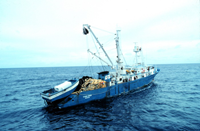Marine Pollution: From Vessels

Commerce and trade through shipping has played a major role in the development of the United States and world economy. The vast majority of international trade and commerce continues to be accomplished through shipping. While most of the pollution of the marine environment comes from land-based sources, the international community has cooperated in the development of a number of laws to prevent or minimize pollution from vessels. This has been accomplished consistent with the LOSC. Based on long established traditions, ships have recognized rights (and duties) that must be respected by the coastal State in whose waters the ships operate. Conversely, coastal States have the ability to impose certain regulations on international shipping. The careful balance between the rights of coastal States and international shipping duties is set forth in the 1982 Law of the Sea Convention. In light of the growing importance of safe navigation, the preservation of the marine environment, and the recognition of increasing threats to the environment's health, a number of international agreements have been negotiated to address concerns of pollution of the marine environment from ships and other sources, including the the International Convention for the Prevention of Pollution from Ships (MARPOL) offsite link (document download) and its six Annexes: I. Regulations for the Prevention of Pollution by Oil offsite link (10/02/83) (document download), II. Regulations for the Control of Pollution by Noxious Liquid Substances in Bulk offsite link (04/06/87) and (document download), III. Prevention of Pollution by Harmful Substances Carried by Sea in Packaged Form offsite link (07/01/92) and (document download), IV. Prevention of Pollution by Sewage from Ships offsite link (09/27/03) (document download), V. Prevention of Pollution by Garbage from Ships offsite link (12/31/88) (document download), and VI. Prevention of Air Pollution from Ships offsite link (05/19/05) (document download); the International Convention on the Control of Harmful Anti-fouling Systems on Ships offsite link (09/27/08); and the International Convention for the Control and Management of Ships' Ballast Water and Sediments offsite link (not yet entered into force) and document download.
Additional reference information: ![]()
- Coast Guard Authorization Act of 2010. The Act materially enhances the marine safety and maritime security missions of the Coast Guard, and it includes language to implement the International Convention on the Control of Harmful Anti-Fouling Systems on Ships, 2001, which now aligns U.S. law with international standards related to anti-fouling systems by prohibiting the sale, distribution, manufacture, or use of organotin (which is a chemical used to inhibit the growth of marine organisms on vessel hull).
- US implementation of Annex VI Marine Pollution Act of 2008
- Global Invasive Species Programme (GISP) (UNEP)
Related Pages
- Marine Protected Areas
- Particularly Sensitive Sea Areas (PSSAs)
- Special Area Designations
- Emission Control Areas
- Areas to be Avoided
- No Anchoring Areas
- Mandatory Ship Reporting Systems
- Conservation of Endangered Humpback Whales
- What is the biggest source of pollution in the ocean?
Last updated February 2, 2018


